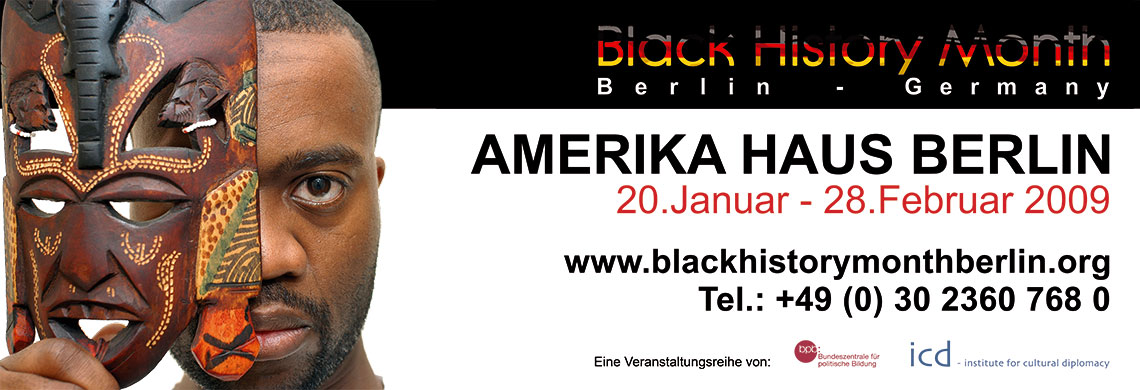A Tribute to Theodor Wonja Michael
Black History Month in Berlin returned to the Amerika Haus on Thursday 26th February for an event that celebrated the life of one of the most influential and active members of the Afro-German community, Theodor Wonja Michael. Organised by the Institute for Cultural Diplomacy (ICD), the Federal Agency for Civic Education (bpb), and lawyer and consultant John Eichler, the evening began with a short introduction by ICD Director Mark Donfried, who then welcomed Mr. Eichler to the stage.
To illustrate the aims of Black History Month, Mr. Eichler began by playing the audience a section from Beethoven’s ‘Kreuzter Sonata’ and sharing the interesting history behind it. At a performance of the sonata in 1802, Beethoven’s lead violinist and soloist – and musician to whom the sonata was originally dedicated - was George August Bridgetower, the second son of a former Slave who came to Europe from Barbados and a German or Polish mother (her background is unknown). Known as ‘the Caribbean Saxon’, Bridgetown clearly shows that the history of the African Diaspora in Germany is long and rich, and Eichler used this story to exemplify the aim of Black History Month: ‘to transform [Black history] as part of an overall history, to write and reclaim’.
Eichler then spoke about his own experiences growing up as an Afro-German in East Germany, and how the lack of Black German role models meant that those who were active and made their presence felt were invaluable. Here, he referred to Theodor Michael: ‘he became a living example of how to become a distinguished member of the Black community in Germany’. Born on January 15th, 1925, Theodor Wonja Michael grew up with foster parents and as a child took part in ‘ethnic entertainment shows’. When the National Socialists came to power he worked as an extra in numerous UFA productions of colonial propaganda movies, a job that guaranteed an income and self-protection. In 1943 he was put in a concentration camp, to be freed two years later by the Red Army. During the post-war period, he worked for the US Army for a while, before going to school to gain the qualifications needed to go to university, which he succeeded in doing and studied political science in Hamburg and Paris. Later working as a journalist and lecturer, Theodor Michael also continued to act in the theatre and on television shows.
Following Mr. Eichler’s outline of Michael’s incredible life, Mark Donfried returned to the stage to present the ICD Black History Month Award 2009 to Theodor Wonja Michael for his work as an Ambassador for the Afro-German community, and for his lifelong promotion of dialogue, trust, and understanding between cultures. Michael thanked John Eichler and Mark Donfried and then spoke about the task that faces black and white historians alike in re-writing a history that allows for a plurality of voices rather than a single, imperialist narrative. He spoke in particular about a petition that was drafted in 1919 by a group of Cameroonians living in Germany that demanded of the ‘German Socialist Republic’ the continued presence of Germans in Cameroon along with thirty-two suggestions for the treatment of colonial subjects. These included the same equal rights for Africans living in Germany as those enjoyed by the German citizens of the newly founded Republic. The petition fell on deaf ears, yet the very existence of such a document, according to Theodor Michael, marked the beginning of a specifically German postcolonial discourse and remains relevant today.
Theodor Michael received a standing ovation from the audience for his presentation, and then joined John Eichler and Astrid Berger-Mohammad-Foghy, a women’s representative for a Berlin locality, to discuss the African Diaspora in Germany. A number of topics were covered, including the highly influential book ‘Farbe Bekennen’, written about a group of Afro-German women in 1986. They spoke of the organisations that came out of the writing of the book, the Initiative Schwarze Menschen in Deutschland (ISD) and ADEFRA, and how their creation represented a milestone in Black German History. Finally, the panellists reflected on their feelings as Barack Obama won the U.S presidential elections to become the first black President of the United States: Theodor Michael asserted that this was ‘the beginning of a new age’.
A screening of John Kantara’s documentary ‘Blues in Schwarzweiss’ (1988) followed the discussion, a dynamic and illuminating film that successfully reveals the diversity of the Afro-German community and explores the lives of key figures. The film focuses in particular on Theodor Michael, late poet and activist May Ayim (1960 – 1996), and musician and activist Tyron Ricketts, and gave the audience to opportunity to see the life of Theodor Michael from another perspective.










